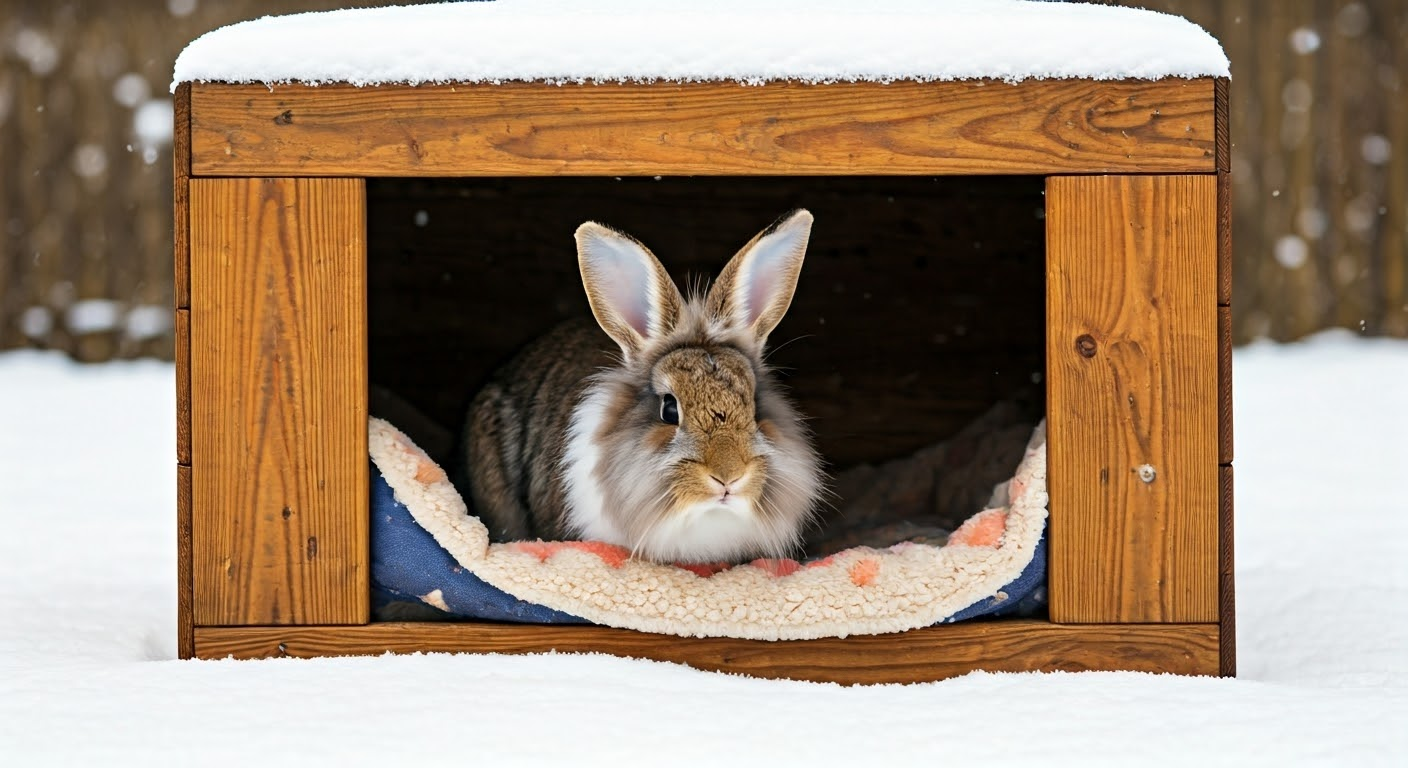The sudden death of a rabbit is very hard for any owner. Rabbits can live for several years and can grow old. However, they can have health issues linked to their diet that might become serious fast. This includes the danger of poisoning if they eat poison. It is vital to understand the reason for their death and the causes of sudden death in rabbits. These causes can include risks from cold weather. Knowing when to seek emergency vet help is also important. This information is key for taking good care of your rabbit.
Key Highlights
- Rabbits can be sensitive to temperature shifts. They might suddenly die in cold weather.
- A risk that rabbits face is hypothermia. Owners need to know signs like being tired and not eating.
- It is very important to give rabbits good housing, food, and water during winter for their survival.
- Being aware of signs of cold-related sickness, like GI stasis, is important. This helps in getting quick help from a vet.
- Knowing why rabbits might die suddenly can help owners take steps to prevent it.
The Impact of Cold Weather on Rabbits

Cold weather can be hard for warm-blooded animals. People often forget about how it affects rabbits. Rabbits are made for mild weather. They struggle a lot in really hot or really cold temperatures.
When it gets cold, rabbits can have serious health problems. This is especially true for rabbits that live inside.
How cold temperatures affect rabbit health
A rabbit’s body temperature is usually higher than ours. It typically ranges from 101 to 103 degrees Fahrenheit. To keep this body temperature stable, rabbits rely on their environment and metabolism. When it’s freezing, rabbits can struggle to maintain their internal temperature.
Rabbits are prey animals. When they feel sick, they hide. This makes it hard to find health problems early. As a result, owners of young untrained puppies and large dogs may only notice their older rabbit friends are ill when it’s very serious. This can harm the rabbit’s delicate backbone. Sometimes, it becomes too late to give proper treatment. If you are adopting from rabbit sellers, it’s important to learn about the typical sizes of rabbits for good care.
It’s important to understand how cold weather can affect a rabbit’s health. Cold can cause serious problems like hypothermia. Knowing these risks is important for anyone who owns a rabbit, especially in winter.
Signs of hypothermia in rabbits
Hypothermia happens when a rabbit’s body temperature goes down too much. This can be quite dangerous, especially when it is cold outside. It is important to recognize the signs so you can help avoid sudden death.
A rabbit that has hypothermia might seem tired and weak. They may not feel like moving much. There are other signs too, such as a slower heart rate and breathing. You should check their gums and eyelids. If these appear pale or bluish, it is a sign of trouble. Their ears and paws could also feel cool when you touch them.
If you think your rabbit has hypothermia, act quickly. Wrap them in a warm towel. Then, call an emergency vet right away. Quick help from the vet can make a little bit of difference for their survival.
Preventative Measures for Rabbit Owners
It’s important to keep our bunnies safe from the cold. The good news is that we can help them easily. With a little planning and by taking some simple steps, we can reduce the risks that cold weather brings to our furry friends.
We can ensure that bunnies have the right shelter and provide them with better food. These actions can help keep our bunnies healthy during winter.
Tips for keeping your rabbit warm during winter
First, it is important to ensure your pet rabbit, or bun, has a warm and safe place. This can be a hutch or an indoor setup. It should have good insulation and no cold air coming in. Make sure it is off the ground. Provide your rabbit with lots of bedding like hay, straw, or shredded paper so they can burrow. You may want to use a pet-safe heating pad or a hot water bottle wrapped in a towel to help keep them warm.
Next, it’s important to keep your rabbit’s body temperature steady during the cold months. A proper diet that is high in fiber, especially hay, helps them generate warmth inside.
Here are some helpful tips:
- Provide better quality hay.
- Supply fresh, clean water several times each day and make sure it doesn’t freeze.
- Give a little bit of leafy greens, such as kale or spinach, for added nutrients.
- Consider getting a sweater safe for rabbits to keep them warm, especially for smaller breeds.
Best practices for indoor and outdoor rabbit housing in cold weather
You can decide if your pet rabbit stays inside or outside based on your weather and what your rabbit needs. No matter where they live, having the right home is very important for the health of pet store rabbits, especially in winter.
Remember, indoor animals can feel the cold too.
|
Housing Type |
Best Practices |
|
Indoor Housing |
Provide a dedicated space away from drafts, like windows and doors. Offer a warm and comfortable hiding spot, like a cardboard box filled with hay. |
|
Outdoor Housing |
Ensure hutch is waterproof and insulated. Use a hutch cover to shield from wind, rain, and snow. Place the hutch in a sheltered location. |
Regularly check the temperature in your rabbit’s home and change it if needed. Keeping the area at a good temperature helps stop cold-related illnesses. One of these illnesses is GI stasis, which can affect their GI tract and health.
Recognizing and Responding to Cold-Related Illnesses

Sometimes, no matter how much we try, our pets can still get sick. Their love for us makes it tough to watch them feel bad, especially after the last time they were ill. It is important to know the signs of cold-related sickness. This helps us get them the care they need quickly.
Getting help fast can really change how well they feel better.
Common cold-related illnesses in rabbits
Rabbits have to deal with more than just hypothermia in cold weather. A big concern is GI stasis, and this should be checked by a rabbit savvy vet. GI stasis is a serious issue where food moves slowly or stops in the mother rabbit’s digestive system. This creates a toxic situation. It can cause gas buildup and other dangerous problems. This includes the risk of a normal miscarriage if the mother rabbit is under a lot of stress.
Another risk is respiratory infections. They can occur from drafts or a weak immune system. Look out for signs like sneezing, nose discharge, and difficulty breathing.
It’s very important to recognize the signs of these problems. Taking your rabbit to the vet right away can help stop sudden death. Fast treatment can really boost your rabbit’s chances of getting better.
When to seek veterinary care for your rabbit
Keep an eye on your rabbit’s behavior and health. This is really important, especially when the weather changes. If you see any changes in how much your rabbit eats, like having a little appetite, how they go to the bathroom, or their mood, it’s a good idea to call your veterinarian. Waiting too long for help can be harmful, especially with fast illnesses that rabbits might have.
If you think your rabbit might have hypothermia, GI stasis, or a respiratory infection, you should take them to the vet quickly. My personal experience tells me that signs like tiredness, loss of appetite, and trouble breathing can be very serious. These similar symptoms can change quickly, leading to big problems in a matter of hours. If you notice these signs, you should visit an emergency vet right away, especially for baby bunnies.
Acting fast is usually the best way to treat rabbits. It can help stop sudden rabbit death or fatal conditions, which is important for new rabbit owners. A good thing to do is build a strong connection with a vet who knows about rabbits. You should also be ready to use a fly guard in your pet’s area to prevent foul smell problems. Try to avoid situations that could lead to a dirty bottom. Seeking help quickly can really improve your rabbit’s health and extend its lifespan.
Nutritional Considerations in Cold Weather
Rabbits, like us, need good food in winter to feel warm and healthy. A balanced diet gives them the nutrients they need. This helps them make energy, so they feel good even in the cold.
Rabbits’ diets can change during winter. It is important to pay attention to what they eat to keep them healthy.
Adjusting your rabbit’s diet for the winter
The main part of a healthy diet for a rabbit is fresh, good-quality hay. This should make up around 80% of their food. In the winter, you can give them a little extra hay. It helps to keep them warm as they digest it and supports a healthy GI tract.
Give your rabbit hay and fresh vegetables every day. Good choices are leafy greens such as kale, spinach, parsley, and cilantro. Avoid iceberg lettuce. It doesn’t have much nutrition and may upset their stomach. You can also offer pellets, but choose ones that are high in fiber and low in calories. Serve them in small amounts.
- Be careful when changing your rabbit’s food.
- Sudden changes can upset their stomach.
- Always give them clean, fresh water.
- Watch your rabbit’s weight and body condition.
- This will help you make sure they get the right amount of food.
The importance of hydration in preventing cold-weather health issues
Water is crucial for life. It’s very important for a rabbit’s health, especially in winter. Keeping rabbits hydrated helps them digest food properly. This is essential to avoid problems like GI stasis. If rabbits drink less water, it can worsen this serious issue and may cause dangerous health problems.
In winter, baby rabbits might drink less water, especially in really cold weather. However, it is important for them to stay hydrated. If rabbits become dehydrated, they can face more health issues and may eat less food. Not eating enough can upset their gut flora and increase the risk of GI stasis.
To make sure your rabbit drinks enough water, always give fresh and clean water in a bowl that’s easy to reach. You can also add water-rich vegetables like cucumber or zucchini to their daily food. This will help them stay hydrated.
Conclusion
In conclusion, it is key to understand how cold weather affects rabbits. Watch for signs of hypothermia in them. You should take steps to keep them warm and provide good housing. It is also important to know about common illnesses that relate to the cold. Changing their diet and ensuring they have enough water is vital too. If you feel your rabbit is sick due to the cold, take them to the vet right away. Putting your rabbit’s health and comfort first during cold weather will help them feel happy and thrive. A little extra care can keep your rabbits safe and healthy.
Frequently Asked Questions
Can rabbits survive in outdoor hutches during winter?
A healthy rabbit can live in an outdoor hutch during winter if you prepare it properly. First, make sure the hutch has good insulation. It shouldn’t let in drafts. Also, add enough bedding so the rabbit can burrow. This will help keep its body temperature warm in the cold.
How can I tell if my rabbit is too cold?
If your pet rabbit looks very tired, has cold ears or paws, or won’t eat, it might be too cold. These signs could mean hypothermia. You should see a vet quickly to prevent sudden death. This is especially important if they also seem lazy and sit in their litter box.
What are the first aid steps if my rabbit is showing signs of hypothermia?
If your rabbit feels cold, take a warm towel and wrap it around them. This will help bring their body temperature up slowly. It’s very important to contact an emergency vet right away. Your rabbit needs expert care to feel better from this serious condition.

Hi, I’m Sondip,
I’m a writer who loves to help people solve their problems. I write about small animals like mice and other small animals and even pests.

